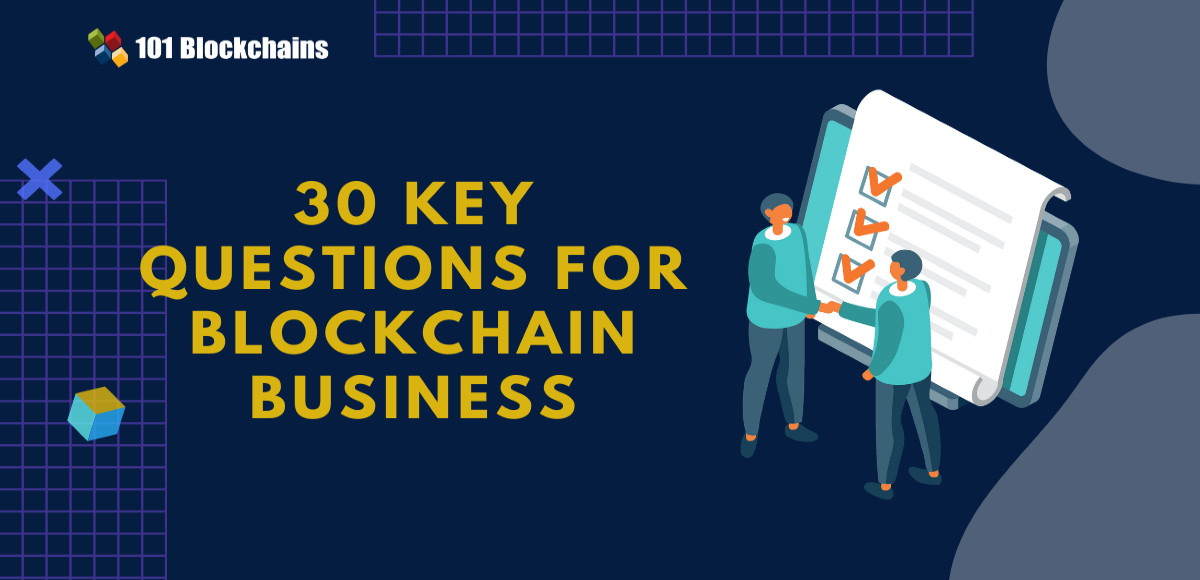Learn how blockchain truly works, master key definitions, and uncover what makes smart contracts so "smart." Dive into the fundamentals, gain valuable insights, and start your blockchain journey today!

- Opinions
Gwyneth Iredale
- on September 26, 2020
How Blockchain is Future of Technology!
The increasing role of automation in almost every aspect of daily life is slowly becoming prominent. The days are gone when you had to remember lengthy to-do lists or write them on pieces of paper and struggle to place them where you could remember to find them. That’s a lot of effort that went into a simple to-do list. Skip to the present; we have technology doing the job for us without having to cram up our minds with loads of information.
Technological advancements have provided us better ways of storing, processing, and accessing the data we want for specific purposes. One of the notable technological advancements, in this case, would be blockchain technology. Blockchain is future of storing data online, and the innovation in blockchain presents adequate proof for the same.
Blockchain involves a unique technique for documenting user data across a network of systems or machines without giving ownership of data to a single entity. The best factors about blockchain and its future potential refer to security systems and the immutability of data on the blockchain.
The close relation of blockchain with cryptocurrency has been a notable aspect of anticipating the future of blockchain technology. Blockchain technology has shown promising potential in transforming monetary systems and continues to garner the attention of other sectors. As blockchain technology slowly gains mainstream recognition, let us take a look at how blockchain is future of technology.
Build your identity as a certified blockchain expert with 101 Blockchains’ Blockchain Certifications designed to provide enhanced career prospects.
Importance of Blockchain Technology
In order to understand the future potential of blockchain technology, it is important to understand the technology first. For example, customers showcase different behaviors and could fall into same patterns upon closer reflection. Artificial intelligence capabilities in modern technology enable it to store and analyze inputs for rendering results that match the typical consumption patterns of customers.
In the case of automobile rental apps such as Uber, you don’t have to feed regular pick up location always. So, you can notice that eCommerce sites like Amazon and rental apps such as Uber use customer data and leverage it for driving customers to make repeated purchases. Now, blockchain is future because it completely changes this mechanism and takes away intermediaries like Uber or Amazon.
On the contrary, it provides users the capability to store information that a service provider could access without any intermediary. Blockchain technology basically introduces democracy in the process of sharing and accessing data throughout the world. You can think of blockchain as just a chain of blocks, in the literal sense, with the blocks serving as repositories for information.
Users enter information into blocks and are updated in the block as nodes or records after every computer on the cluster verifies the block. The ‘chain’ in blockchain technology delivers direct contact between service providers and users. As a result, data remains unique and secure while imposing zero transaction fees. So, one can clearly notice the potential of blockchain for improving transparency and reducing overall costs. These are sufficient enough reasons to answer ‘why blockchain is future’.
How does Blockchain Work?
The next important aspect of blockchain technology that can explain its potential as a futuristic technology is its working. Let us think of it as a network of databases with common ownership or spreadsheets. The spreadsheet is commonly managed and has access privileges for multiple networks with authorization. In the case of blockchain, you have to share spreadsheets with desired recipients while the relevant stakeholders have common ownership of the spreadsheet.
If you make any changes in the spreadsheet, then other parties in the network have to verify them. As a result, you don’t have to face any unnecessary loss of data or tampering throughout all channels. Blockchain technology also enables hosting of the database through multiple computers on the network. Therefore, blockchain is future of technology on the basis of decentralization apart from immutability and transparency.
Blockchain technology includes the use of peer to peer networks for chaining the blocks of data together to enable direct client-server access. When you enter information into a block, the nodes collect the data and secure it with hash functions. The node also distributes the information and related tasks throughout various networks, thereby promoting collective ownership among blocks in the network.
Another traditional example of the working of blockchain can also provide additional insights on how blockchain is future of technology. Banks have been the traditional institutions for financial transactions. For transferring money, you have to visit the bank, fill out the required forms, and then transfer the money from your account to the recipient’s account through the bank.
In the digital era, the lengthy processes have been replaced with payment channels such as Google Pay or PayTM. Blockchain technology takes away the need for taking your payment through the banks or portals and helps you make direct money transfers. The facility of such convenience in executing financial transactions with trust would be a prominent factor in driving the popularity of blockchain in the future.
Start your blockchain journey Now with the Blockchains Fundamentals Free Course
Blockchain Future Trends
Talking about the future, it is better to rely on some prediction to understand how blockchain is future of technology.Here are some of the market predictions and statistics that make market analysts and economics term blockchain as the future.
- Almost half of smartphone owners without any access to a conventional bank account would use mobile-access cryptocurrency accounts by 2025.
- Blockchain technologies would serve as the authentication mechanism for almost 30% of the global news and video content by 2023.
- Notable cryptocurrency exchanges employing multiparity computation (MPC) for enabling private key protection and signoff would increase from 1% to 50% by 2022.
- Mainstream development and deployment of decentralized application and smart contracts would become accepted blockchain technical standards by 2023.
- The costs would surpass the returns for almost 30% of smart contracts by 2023.
Therefore, one can clearly notice that blockchain is future of technology for almost every sector. Internet of Things, governance, stock trading, and supply chain operations- blockchain is making its market everywhere. In the long run, blockchain continuous innovation would result in long-term interventions of blockchain for all aspects of daily lives. At the same time, blockchain would be a prominent tool for disruption across different industries.
Gartner estimates that blockchain is future of technology due to the rapid development. According to Gartner, general blockchain platforms would facilitate interoperability, ease of use and access, scalability and support for trusted private transactions. Furthermore, blockchain would continue to present better opportunities for enterprises to address their concerns about data confidentiality.
At present, the above-mentioned trends showcase the potential future of blockchain and its role as a disruptive technology. After achieving these steps, permissioned blockchains and public blockchains may come together in the future. So, blockchain can also enable development of solutions for public use cases with better control over membership, operating model, and governance like in permissioned blockchains.
Not sure how to build your career in enterprise blockchains? Enroll Now in How to Build Your Career in Blockchains Course
Where is the Future of Blockchain Headed?
One would barely face any difficulties in arriving on the conclusion that blockchain is future with the above-mentioned information. Blockchain is touted as one of the potential technologies for contributing social value through resolving the circulation of fake news and video content. Blockchain technology can also facilitate creation of new financial and eCommerce markets for the world population still untouched by banking.
However, the trends don’t exactly seem to reach the expected figures soon! So, what’s holding back the adoption of blockchain technology? Blockchain technology, even though powerful, has limits in terms of maturity. It has to develop and provide the assurance to enterprises for gaining desired market visibility and utility for different use cases.
Many of the blockchain enterprise projects are still in the experimentation phase, and blockchain technologies have not been able to match up to expectations of fostering new business models and societal change. On the other hand, experts recommend staying away from being disappointed quickly with the potential of blockchain.
Many Gartner reports have already pointed out that blockchain technology would achieve the desired market visibility and adoption by 2023. The reports primarily point out factors such as the progress of blockchain technology and support for pragmatic use cases as reasons for long-term sustenance and improvement of the value of blockchain technology.
Start learning Blockchain with World’s first Blockchain Career Paths with quality resources tailored by industry experts Now!
Final Words
On a concluding note, it is evident to note that blockchain future trends would take time to build prominence. Most important of all, blockchain technology ensures the possibility of improving data transparency and immutability and improved decentralization of information. Since its inception with the arrival of cryptocurrencies, blockchain has shown immense potential for transforming conventional approaches for financial transactions.
So, basically, blockchain is future of technology that can make vital contributions to global economic development. One of the notable highlights in the long run with blockchain technology would be complete independence from the back-end. Users don’t have to care about interfacing with the blockchain, selecting the platform, smart contracts, and consensus algorithms.
The sole focus of users in the blockchain would be on smart contracts and decentralized applications. Presently, the slow yet remarkable developments in blockchain technology showcase bright prospects for large-scale use of blockchain. For example, Facebook and PayPal plan to facilitate mobile-based cryptocurrency wallet services by 2022 for more than 750 million customers. Seems like a fair proposition for the future of blockchain!
The future of blockchain technology is bright, even blockchain itself is the future. So, it’s the right time to start your career in Blockchain Technology. To help you in your Blockchain journey, we offer Free Blockchain Course; enroll now to get ahead!
*Disclaimer: The article should not be taken as, and is not intended to provide any investment advice. Claims made in this article do not constitute investment advice and should not be taken as such. 101 Blockchains shall not be responsible for any loss sustained by any person who relies on this article. Do your own research!




![Future of Blockchain: Predictions for 2022 [UPDATED] future of blockchain predictions](https://101blockchains.com/wp-content/uploads/2020/12/future-of-blockchain-predictions.png)

